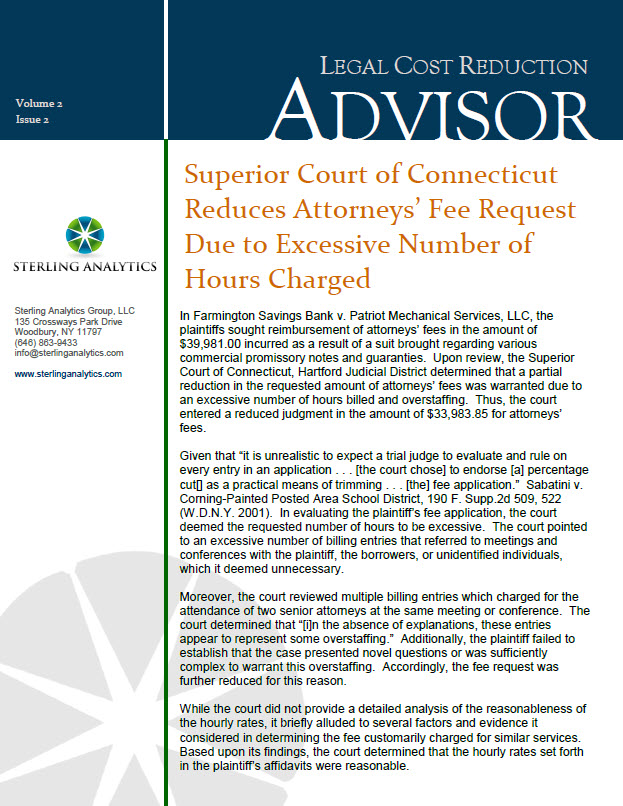In Farmington Savings Bank v. Patriot Mechanical Services, LLC, the plaintiffs sought reimbursement of attorneys’ fees in the amount of $39,981.00 incurred as a result of a suit brought regarding various commercial promissory notes and guaranties. Upon review, the Superior Court of Connecticut, Hartford Judicial District determined that a partial reduction in the requested amount of attorneys’ fees was warranted due to an excessive number of hours billed and overstaffing. Thus, the court entered a reduced judgment in the amount of $33,983.85 for attorneys’ fees.
Given that “it is unrealistic to expect a trial judge to evaluate and rule on every entry in an application . . . [the court chose] to endorse [a] percentage cut[] as a practical means of trimming . . . [the] fee application.” Sabatini v. Corning-Painted Posted Area School District, 190 F. Supp.2d 509, 522 (W.D.N.Y. 2001). In evaluating the plaintiff’s fee application, the court deemed the requested number of hours to be excessive. The court pointed to an excessive number of billing entries that referred to meetings and conferences with the plaintiff, the borrowers, or unidentified individuals, which it deemed unnecessary.
Moreover, the court reviewed multiple billing entries which charged for the attendance of two senior attorneys at the same meeting or conference. The court determined that “[i]n the absence of explanations, these entries appear to represent some overstaffing.” Additionally, the plaintiff failed to establish that the case presented novel questions or was sufficiently complex to warrant this overstaffing. Accordingly, the fee request was further reduced for this reason.
While the court did not provide a detailed analysis of the reasonableness of the hourly rates, it briefly alluded to several factors and evidence it considered in determining the fee customarily charged for similar services. Based upon its findings, the court determined that the hourly rates set forth in the plaintiff’s affidavits were reasonable.
Implications for Legal Billing: When multiple attorneys charge for their attendance at the same meeting or conference, this often serves as the basis for a reduction in the amount of attorneys’ fees to be awarded. Attorneys would do well to be ready to justify the presence of multiple attorneys at conferences or in court, when it is not obvious why so many attorneys are needed. Further, descriptions must make the need for staffing clear. Moreover, in order for such duplicative and excessive billing entries to be deemed permissible, the case must present novel questions or be particularly complex to warrant the presence of more than one attorney. As the court briefly mentioned, if the descriptions provide a sufficient explanation, either directly or indirectly, as to why the presence of more than one attorney is justified, then the charge may be deemed permissible. Outside of such circumstances, the excessive charge will often be reduced.
Farmington Savings Bank v. Patriot Mechanical Services, LLC, 2004 WL 422954 (Conn. Super. 2004). Full copies of the court decisions may be available through counsel or various Internet links or paid services.
By Madeline Zuckerman


